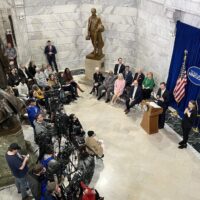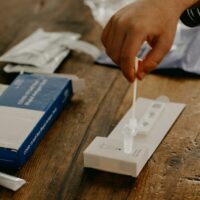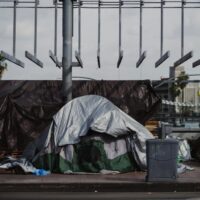Gov. Andy Beshear announced 647 new coronavirus cases on Monday, bringing the unadjusted seven-day rolling average to 1,065, five under the record set Saturday.
He said this is the highest number of cases the state has seen on a Monday, which are typically lower than other days because many laboratories aren’t open or don’t report cases on the weekend.
- SUBSCRIBE: Sign up for Hoptown Chronicle’s newsletters
“At a time when we need cases to be going down, when more people are going to be going inside, when our kids are going back or will be back in school in some places, we need to do better,” Beshear said at his daily briefing. “If we want to keep doing some of the activities that we’re doing now, we need to keep doing better.”
The share of Kentuckians testing positive for the virus in the past seven days was 4.97%, perilously close to 5%, which would put the state as a whole in an official danger zone. Many if not most of Kentucky’s counties already are.
Beshear said 764 people in Kentucky are hospitalized with COVID-19, which appears to be a record. He said 190 of them are in intensive care and 89 of those are on a ventilator.
The governor said the state has enough hospital capacity, but cautioned that could change very quickly with a rapid increase in case numbers. He said nearly 66% of the state’s hospital beds are occupied, 71% of its intensive care beds are occupied, and only 28% of its ventilators are in use.
Asked if he would implement any new restrictions based on the latest escalation of cases, Beshear said, “We are not currently looking at new restrictions, but we have got to get these numbers down.” If that doesn’t happen, he said, “I fully anticipate that the White House will ask us again to limit bars and restaurants.”
He added, “We now know how to stop the spread of the virus, we’ve just got to be willing to do it.” He stressed the importance of wearing a mask and keeping it on when you are around anyone who does not live in your household, making sure you don’t have more than 10 people over to your house, social distancing, keeping your hands washed, staying home when sick and getting tested regularly.
The state reported its highest number of new cases last week, 7,352, not counting the week before, when it reported 7,444 and 1,426 of them were backlogged cases from Fayette County.
Lt. Gov. Jacqueline Coleman praised the 1,570 Kentucky schools that have reported their coronavirus data for at least one day on the K-12 dashboard, including the 41 that newly reported since last week. However, she said that still leaves 162 that have never reported any information since the dashboard went live three weeks ago. Coleman said the dashboard is meant to give Kentucky families a snapshot of where their school is in the fight against coronavirus.
“Our Kentucky families need that kind of effort and commitment from every education leader on a normal day, but certainly during the middle of a global health pandemic,” she said.
Health Commissioner Steven Stack said the first shipment of the vaccine is expected in late 2020 or early 2021 from the federal government and that the initial shipment will be in “small quantities.” He added that the vaccine will be distributed in a phased approach, with the first doses being given to frontline health care workers and first responders followed by those who are considered high-risk. As more vaccine becomes available, it will be offered to the general public.
“We’re cautiously hopeful that by later next year, we should have quite a sufficient quantity to be able to vaccinate the vast majority of the American people,” he said.
Beshear announced nine more deaths from COVID-19, bringing the state’s death toll to 1,326. He stressed that every death on that list is related to the disease, after examination of cases by public-health experts.
“We do more work to confirm that COVID-19 was a contributing factor to these deaths than just about any other state,” he said. “This disease is devastating to each and every one of these families. This virus is real, and it is cruel.”
Beshear honored the life of Ruthie Martinez, a 49-year-old Lexington woman who died of COVID-19. She was a teacher at Winburn Middle School. Her husband of 28 years, Miguel, told Beshear that his wife was “a terrific teacher and an amazing human being” who will be missed by him, their children, her grandchildren, all those who loved her and the students she impacted.
Beshear continues to conduct his daily briefing remotely as he and his family remain in quarantine after being potentially exposed to the virus on Oct. 10 by a member of their security detail. Beshear said his family continues to test negative for the virus and that they feel well.
In other coronavirus news Monday:
Lexington’s coronavirus cases are trending slightly upward after hitting a plateau in early October and the increase is not coming from University of Kentucky students as it did in September, Jeremy Chisenhall reports for the Lexington Herald-Leader.
Of today’s new cases, 81 were people 18 and younger, of whom 18 were 5 and under.
Monday’s nine fatalities were an 82-year-old man from Franklin County; a 73-year-old man from Jefferson County; a 58-year-old man from Lincoln County; a 73-year-old man from Marshall County; an 83-year-old woman from Mercer County; an 85-year-old man from Owen County; a 70-year-old woman and a 93-year-old man from Todd County; and a 72-year-old man from Wayne County.
In long-term care, 40 more residents and 24 more staff have tested positive for the virus, with 971 active resident cases and 609 active staff cases. Beshear said 30 more deaths can be attributed to the facilities, for a total of 809 resident and five staff deaths attributed to COVID-19.
Beshear said three more veterans have tested positive for the virus and another veteran has died from it at the Thomson-Hood Veterans Center in Wilmore. The long-term care daily report shows the center has 49 active resident cases and 32 active staff cases and that 10 residents have died from COVID-19 at the center.
The K-12 student report shows 23 more students and seven more staff and faculty testing positive for the virus, and one death.
The college and university report shows 31 more students have tested positive for the virus.
The K-12 report and the college and university report are again reporting daily cases.
Eleven states are on Kentucky’s travel advisory because they have a positive-test rate of 15% or higher. They include: Iowa, Nevada, South Dakota, Idaho, Wisconsin, Wyoming, Nebraska, Kansas , Mississippi, Alabama and Utah. Kentuckians who travel to these states are asked to isolate for two weeks upon return. The list does not include Florida, but the state continues to recommend a two week quarantine for Kentuckians who travel there “due to the removal of public health restrictions.”
A recent cluster of cases at Western Kentucky University “was the result of a student who refused to isolate after becoming sick with the disease, WKU Acting Provost Cheryl Stevens notified faculty Thursday,” Aaron Mudd of the Bowling Green Daily News reports. “Last week, there was a small group of students that tested positive after exposure to a sick student who didn’t want to quarantine,” Stevens told the Faculty Senate. Mudd reports, “It was not immediately clear Thursday evening whether the student in question would face disciplinary consequences.”
Discord on the White House Coronavirus Task Force “has worsened since the arrival in late summer of (Dr. Scott) Atlas, whom colleagues said they regard as ill-informed, manipulative and at times dishonest,” The Washington Post reports. “Response coordinator Deborah Birx is tasked with collecting and analyzing infection data and compiling charts detailing upticks and other trends, but Atlas routinely has challenged Birx’s analysis and those of other doctors, including Anthony S. Fauci, Centers for Disease Control and Prevention Director Robert Redfield, and Food and Drug Administration Commissioner Stephen Hahn, with what the other doctors considered junk science, according to three senior administration officials.”





